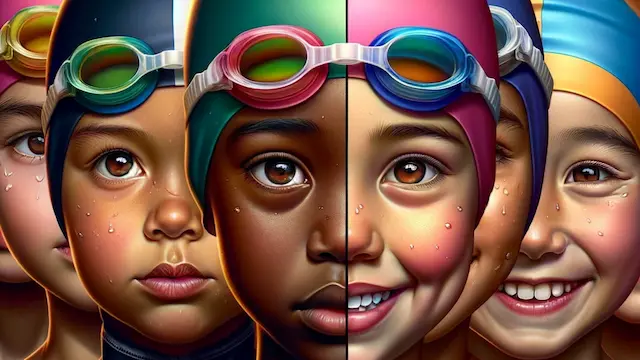Finding Your True Roots: 5 Key Explorations of Identity and Belonging

If you've ever felt lost or disconnected from your roots, you're not alone. Many of us struggle with questions of identity and belonging, wondering where we come from and where we fit in.
But finding your true roots can be a profound journey of self-discovery, leading to a deeper understanding of who you are and where you belong in the world.

Exploring your identity and roots can take many forms, from tracing your family history to reconnecting with cultural traditions.
It's a deeply personal journey that requires introspection and reflection, but it can also be a transformative experience.
By understanding your past, you can gain a greater sense of purpose and direction in your life, as well as a stronger connection to your community and culture.
Exploring the Depths of ‘Where Are You Really From?'
The Impact of Heritage on Personal Identity
Your heritage plays a significant role in shaping your personal identity. It encompasses your family's cultural traditions, beliefs, and values that have been passed down through generations.
Your heritage can provide a sense of belonging and connection to your roots, which can contribute to your overall well-being.

Genealogy and ancestry research can be valuable tools in uncovering your heritage.
By tracing your family tree and discovering the stories of your ancestors, you can gain deeper insights into the cultural and historical context that has shaped your identity.
However, the impact of heritage on personal identity is not always positive. Sometimes, people may feel disconnected from their heritage due to various reasons such as migration, assimilation, or rejection of cultural practices.
This can lead to a sense of cultural disorientation, which can affect their self-perception and identity.
Unpacking the Layers of Cultural Identity
Cultural identity is a complex and multifaceted concept that involves various layers. It encompasses your ethnicity, nationality, language, religion, and other cultural factors that shape your identity.
Understanding the layers of cultural identity can help you explore the depths of your identity and gain a deeper understanding of where you come from.
For example, your ethnicity may be Ghanaian, but your nationality could be American. You may speak English fluently, but you also speak your native Ghanaian tongue with your family.
You may practice Christianity, but you also participate in traditional cultural practices. All these layers contribute to your cultural identity and shape who you are.
Exploring the depths of ‘where are you really from?' requires a willingness to embrace your heritage and cultural identity.
It involves unpacking the layers of your identity and understanding how they contribute to your overall sense of self.
By doing so, you can gain a deeper understanding of your roots, your community, and your beliefs.

The Complex Fabric of Identity
Identity is a complex and multifaceted concept that can be influenced by a variety of factors, including personal experiences, cultural background, and individual choices.
In “Finding Your True Roots,” exploring the complexity of identity and belonging is a profound journey that can help you gain a deeper understanding of yourself and your place in the world.
Identity Beyond Borders: The Role of Multicultural Experiences
One of the most significant factors that can shape your identity is your experience with different cultures and ways of life.
Exposure to diverse perspectives and values can broaden your horizons and help you develop a more nuanced understanding of the world around you.
In “Finding Your True Roots,” exploring your multicultural experiences can be a powerful tool for self-discovery.
By reflecting on how your interactions with different cultures have shaped your worldview and identity, you can gain a deeper appreciation for the unique qualities that make you who you are.

Choosing Our Identity: The Power of Personal Choices
While external factors like cultural background and life experiences can play a significant role in shaping our identities, ultimately, we have the power to choose who we want to be.
In “Finding Your True Roots,” exploring the decisions that have shaped your identity can be a powerful tool for personal development.
By reflecting on the values and beliefs that guide your choices, you can gain a deeper understanding of what matters most to you.
This, in turn, can help you make more intentional decisions that align with your authentic self and lead to greater fulfillment and happiness.
Reclaiming the Narrative
In the pursuit of discovering your true identity, it is essential to reclaim the narrative that has been assigned to you by society.
Overcoming stereotypes and embracing individual stories is an important step in this process.
Overcoming Stereotypes and Embracing Individual Stories
Stereotypes are often assigned to individuals based on their race, ethnicity, gender, or other factors.
These stereotypes can be limiting and may not accurately reflect the individual's true identity.
By embracing individual stories, you can break free from these stereotypes and embrace your authentic self.

It is important to recognize that everyone has a unique story to tell. Your story is what makes you who you are, and it is what sets you apart from others.
By sharing your story, you can help others understand your perspective and gain a deeper understanding of your identity.
As a Black German, I often encountered the question, “No, where are you really from?”
This question, while seemingly innocent, underscored a common challenge: the assumption that my ethnic background did not align with my nationality.
From a young age, this experience instilled in me a determination to embrace and explore my roots more deeply.
I knew that if people questioned my belonging in Germany, then understanding where I was “really from” was essential not only for my identity but also as a response to these recurring inquiries.
This personal journey into my heritage allowed me to reclaim the narrative of my identity, turning a point of contention into a source of strength and self-awareness.
“People are made of stories. Our personal identity hinges not just on our individual experiences but significantly on the collective narratives we subscribe to.”
Yuval Noah Harari, Historian and Author
The Role of Storytelling in Identity Formation
Storytelling is a powerful tool that can help you discover your identity and connect with others.
By sharing your story, you can create a sense of community and belonging. Your story can also serve as a legacy for future generations.

In the process of finding your true roots, it is important to recognize that your identity is not fixed.
Your identity is constantly evolving and can be shaped by your experiences and the stories you tell.
By embracing your authentic self and sharing your story, you can create a narrative that reflects your true identity and helps you connect with others.
Storytelling plays a crucial role in identity formation and can help you connect with others and create a sense of community and belonging.
The Fluid Nature of Belonging
Belonging is a complex and multifaceted concept that can be challenging to define. It is not something that is static or fixed, but rather a fluid and evolving aspect of our lives.
In ‘Finding Your True Roots,' the exploration of identity and belonging is a central theme that is examined through a variety of lenses.
Belonging Is a Journey, Not a Destination
One of the key insights that ‘Finding Your True Roots' offers is that belonging is not a destination but rather a journey.
It is a process that involves ongoing exploration, discovery, and growth. As you navigate through different stages of life, your sense of belonging may shift and change.
This can be influenced by a variety of factors such as aging, relationships, and community.

Navigating Changes in Belonging as Life Evolves
Life is a dynamic and ever-changing process, and as you move through different stages, your sense of belonging may evolve.
For example, as you age, your priorities and values may shift, and this can impact your sense of belonging.
Similarly, as you navigate different relationships and communities, you may find that your sense of belonging changes as well.
In ‘Finding Your True Roots,' the importance of continuity in the face of change is emphasized.
By exploring your roots and understanding your history, you can gain a deeper sense of connection to your past, present, and future.
This can provide a sense of continuity that can help ground you as you navigate the changes and challenges of life.
Embracing the Diversity Within
When you embark on the journey of finding your true roots, one of the most important things you will discover is the diversity within yourself.
You are made up of many different facets, including your cultural background, your family history, and your personal experiences.
Embracing this diversity is key to understanding your identity and finding a sense of belonging in the world.
Celebrating the Mosaic of Our Identities
Diversity is a beautiful thing. It means that we all bring unique perspectives and experiences to the table and that our differences make us stronger.
When you take the time to reflect on your own identity, you will likely find that you are a mosaic of different cultures, traditions, and beliefs.
Embracing this diversity means celebrating all the different parts of yourself and recognizing that they all contribute to who you are.
One way to celebrate the mosaic of your identity is to explore your family history and learn more about your ancestors.
This can help you understand where you come from and give you a deeper appreciation for the different cultures and traditions that make up your heritage.
You might also consider learning a new language or trying new foods that are part of your cultural background.
Navigating Tensions Within the Diaspora
The diaspora is rich with diverse cultures and histories, which can sometimes lead to misunderstandings and conflicts, often referred to as ‘diaspora wars.'
These tensions may manifest as xenophobia or stereotypes among different groups within the Black diaspora, such as Africans, Caribbeans, and African Americans.
Growing up, I witnessed my cousins in America being teased for their African heritage, which highlighted the distinctions and occasional strife between African and African American communities.

Now, living in America myself, I've encountered situations where the ownership of a business was contested based on whether the owners were African or African American, reflecting a deeper discourse on identity and belonging within the diaspora.
As someone who values open discussions, I believe that while these conversations can sometimes become contentious, they are crucial for building a deeper sense of unity and mutual respect.
By engaging in these dialogues, we can challenge the stereotypes and biases that divide us, focusing instead on building bridges that strengthen our collective identity and support community bonds.
Diversity as Strength: How Varied Backgrounds Strenghten Communities
Diversity is not just important on an individual level, but also on a community level.
When we bring together people from different backgrounds and experiences, we create a stronger, more resilient community.
This is because each person brings unique skills, perspectives, and strengths to the table.
When you embrace the diversity within yourself, you are better able to appreciate and support the diversity within your community.

This might mean getting involved in community organizations that celebrate diversity, or simply taking the time to learn more about the different cultures and traditions that make up your community.
By doing so, you can help create a more inclusive and supportive environment for everyone.
Finding Strength Through Challenges
Discovering your true roots can be a challenging and emotional journey, but it is also one that can provide immense personal growth and strength.
Through facing identity challenges and overcoming obstacles in self-identity, you can build resilience and gain wisdom that will help you navigate life's ups and downs.
Building Resilience by Facing Identity Challenges
As you dig deeper into your family history and cultural roots, you may encounter challenges that force you to confront aspects of your identity that you may have previously ignored or suppressed.
This can be a difficult and uncomfortable process, but it is also an opportunity to build resilience and learn more about yourself.
One way to build resilience is to approach these challenges with an open mind and a willingness to learn.
Embrace the discomfort and uncertainty that comes with exploring your identity, and use it as an opportunity to grow and expand your understanding of yourself.
Seek out support from friends, family, or a therapist if you need it, and remember that it is okay to take breaks from the process if it becomes overwhelming.
Lessons Learned from Overcoming Obstacles in Self-Identity
Overcoming obstacles in self-identity can also provide valuable lessons that you can apply to other areas of your life.
For example, you may learn the importance of self-compassion and self-care, as well as the power of vulnerability and authenticity.

By embracing your true identity and being honest with yourself and others, you can build deeper connections and relationships based on mutual understanding and respect.
You may also discover new passions and interests that align with your cultural heritage, and find a sense of purpose and belonging that you may have previously lacked.
“Our identities are formed by the narratives we absorb about the world and the people we interact with, including the culture we grow up in and the choices we make about who we want to be.”
Prof. Kwame Anthony Appiah, Philosopher and Cultural Theorist
It is important to remember that your journey towards finding your true roots is a lifelong process.
You may encounter obstacles and challenges along the way, but with perseverance and determination, you can overcome them.
As you move forward, keep in mind that your true roots are not just about your past but also about your future.
Your identity and sense of belonging can help guide you towards your goals and aspirations.
Remember to stay true to yourself and embrace the journey of self-discovery. By doing so, you can live a fulfilling and meaningful life that is true to who you are.
IF THIS POST RESONATES WITH YOU, CONSIDER EXPLORING MORE OF OUR WEBSITE AND PINNING ONE OF THE IMAGES BELOW!
Thank you for your support.








